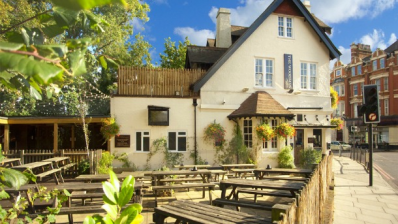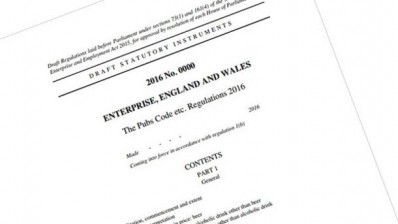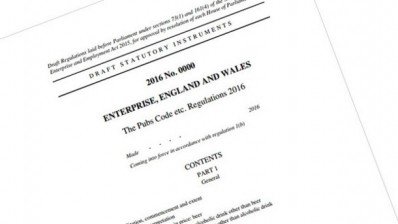Free and easy: pros and cons of free-of tie leased pubs

Freeholds have been the rage with everyone scrambling to get their hands on bricks and mortar, especially in the south of the country. But there are some changes taking place in the market with free-of-tie leases becoming increasingly popular.
And one trend that is starting to see some growth, albeit small, is the free-of-tie lease with the option to buy at a later date. These types of pubs tend to be country, village and fooddriven destination venues, according to property agents.
Davey Co managing director Paul Davey says that over the past three years, this option has become more popular. He says this has nothing to do with the lack of freehold sales because these have grown “quite considerably” especially since the market-rent-only (MRO) option became more prevalent.
He says that offering a free-of-tie lease with the option to buy can be a win-win for both parties.
“The reason that we would do this is because the landlord gets a premium for the lease, with the money received for selling the business and fixtures and fittings up front,” says Davey.
The financial benefit for the pub owner is clear. For example, if the pub was sold at leasehold premium of £100,000 and the rent was £30,000 a year, after three years the landlord has earned £190,000 and still has the freehold asset. The option to acquire the site usually requires the lessee to pay a certain amount of money or open market price – whatever is greater.
For the lessee, there is an equal benefit in taking on a property in this way. Davey says that increasingly small, emerging multiple operators such as members of the MA500 club are looking at this route to taking on a site that reduces their risk of taking on a freehold.
“We see a lot of these operators looking to take a pub on this basis as it is more affordable and less capital-hungry,” says Davey.
“They can take on a site, invest in making it more successful and when it has proved its real value to them, they can exercise an option to buy.”
However, while the benefits for both landlord and tenant can be huge there is still an element of risk. The selection of the correct lessee is really critical and needs to be “a square peg for a square hole”, he reveals.
“That is not always the first person that pitches up and says yes I will take it,” says Davey. “It is matter of who they are, how they are put together, covenant strength, their experience and expertise.”
Benefit of the right operator
The benefit of getting the right operator into the premises for the landlord is huge. In the space of three to five years, a good operator can double the trade on the premises and make the property more valuable. But it has to be the right pub and the right landlord and tenant.
“The critical thing is it’s not right for everybody,” Davey argues.
Property agent Fleurets has also started to see a number of pubs come on the market with this option.
Fleurets director and head of agency Simon Hall says that at the beginning of 2016, with an upturn in the economy, people started to put their freeholds up for sale.
“People who owned freeholds didn’t need to sell because of low interest rates and they could afford to pay the mortgage and were trading well,” he says. “They had been holding on to their retirement plans for too long.”
However, he believes this free-of-tie-with-option-to-buy trend is a phenomenon that is more prevalent in the north of the country than the south. In the south, pubs are attractive to foreign investors and for alternative use.
He agrees that the free-of-tie with option to purchase tends to be for village and food-led destination venues.
“You get the owner-operated freehold with a turnover of £12,000 to £15,000 a week. They are too small for the managed chains and too big for the independent operators,” he argues.
He also cites cash as an issue in the purchase of the freehold. It is not the bank lending that is a problem but the cash stake where the operator may struggle to raise the funds.
Most operators would need the equivalent of around 50% of the purchase price to buy the pub and pay the stamp duty, he reveals.
“The lease with option to buy is, therefore, attractive because there are not enough people who can lay their hands on that sort of cash.
“We offer a lease with an option to buy. So the vendor who wants to get out of the operation can get out of the business, get a rental income and a lump sum.”
The leasehold option
While an operator may struggle to raise the funds for half a freehold purchase price, a leasehold premium of £100,000 would be much more affordable.
“They can run it for a year or two and then go to the bank and say I am a sitting tenant and I want to buy the freehold. The bank, subject to valuation, can then lend up to 90%,” he says.
Meanwhile Neil Morgan, managing director of Pubs & Restaurants at Christie & Co, said this was not necessarily a new trend.
“What freeholders choose to do with their sites very much depends on their personal circumstances in terms of what is most profitable and convenient to them at the time,” he says.
He still believes “freehold is king” and good-quality freeholds are still a rarity that can attract premium prices when they come to the market.
“Often freeholders who are looking to retire will create a free-of-tie lease rather than sell the property to keep the rent as a pension fund and the property for inheritance purposes,” he says.
“Alternatively, some owners opt for a sale-and-leaseback deal to release equity from the pub yet still retain control of the business that they’ve grown.”
He predicts that freehold values are either going to remain where they are or increase because demand from corporate, regional and independent operators and investors will continue to outweigh the level of freehold stock that is available.
Free-of-tie leases
Everard Cole director Jon Heald says there are more free-of-tie leases on the market with the onslaught of MRO. He says there is a lot of interest in these leases and there is a reluctance from a number of operators to look at the tied option.
“For a single or small landlord, there is not a great deal of benefit in offering a tied pub. They see it as creating more admin and are just interested in getting the rent,” he says.
“They haven’t got the will to police it and free of tie is much more attractive to operators. We have quite a few multiple operators looking for sites and they would not entertain a tied unit because they would be looking to increase beer volumes.”
The market for freehold properties remains diverse. And free-of-tie leases with an option to buy are well sought after if not as widespread as some operators would like. But as Davey says, it is not right for everyone, so must be carefully planned for.







